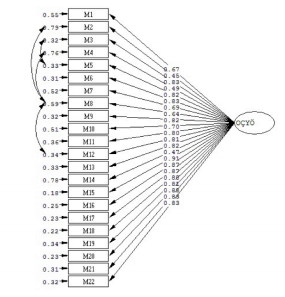This study aimed to develop a scale to measure positive childhood experiences, which are known to be critical to the mental health of individuals. This paper presents the Positive Childhood Experiences Scale (PCES) that was constructed as a result of the conducted study. The psychometric properties of the scale were analyzed using exploratory and confirmatory factor analysis, criterion-related validity, Cronbach alpha internal consistency, and item-total correlations. The proposed questionnaire was administered to 1331 participants (760 females and 571 males) aged between 18 and 70 years (mean age: 32.9). The scale included 22 items after exploratory factor analysis was conducted to investigate construct validity, and yielded one factor that explained 55% of the total variance. The factor loadings varied between .40 and .86. The fit index values of the uni-dimensional model were subsequently tested on another participant group and were determined to be sufficient (x²/ Df=822.17/205, NFI=.98, CFI=98, IFI=.98, RFI=.97, AGFI=.80, SRMR=.04). The criterion-related validity also revealed a positive correlation. The Cronbach’s alpha internal consistency coefficient was found to be .96 and the composite reliability was computed as .97. The corrected item-total correlations ranged from .37 to .83. In sum, the findings of this study suggest that the PCES is a valid and reliable self-report instrument of the positive childhood experiences of adult respondents.
Cite this article as: Doğan, T., Aydın F.T. (2020). Olumlu Çocukluk Yaşantıları Ölçeği’nin Geliştirilmesi. HAYEF: Journal of Education, 17(1); 1-19.




